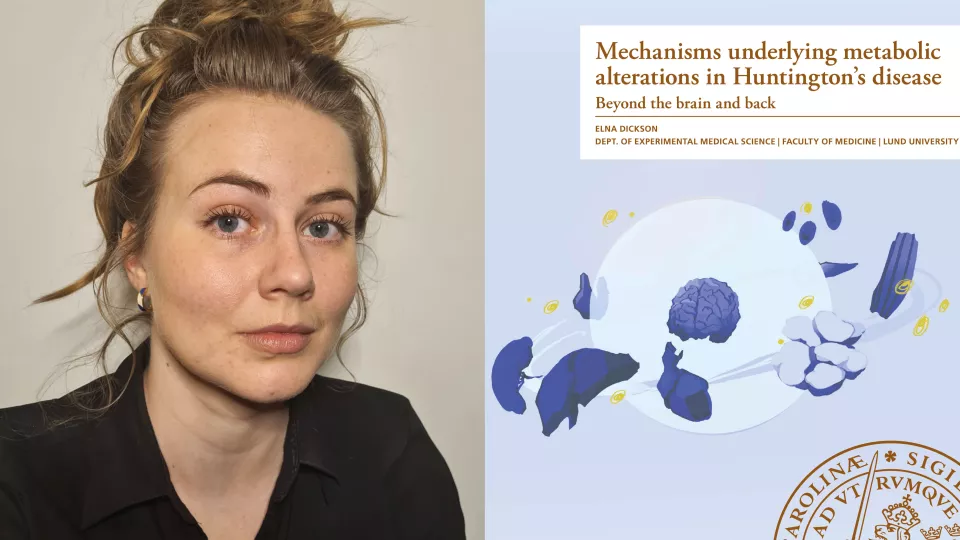Tell us about your research!
"Huntington's disease is an inherited progressive movement disorder due to mutations in the gene encoding the huntingtin protein. The motoric symptoms are caused by degeneration in the basal ganglia, but it has been known for a while now that the mutation also leads to disturbances outside the brain, like cardiac failures, muscle atrophy and endocrine alterations.
My thesis focuses on the link between hypothalamic abnormalities inside the brain and metabolic dysfunctions in the rest of the body. Hypothalamus is a brain region regulating basal functions like sleep and metabolism. This region seems to be affected early in the disease development both in patients and in animal models. I used a mouse model with mutations in this protein, just as patients have, to investigate the role of the huntingtin in this context. The huntingtin protein is involved in several essential cellular functions, such as regulating the cell cycle, gene transcription and molecular transport within and between cells via so-called vesicles."
What makes mutated huntingtin harmful? Is it that they gain functions that are toxic to nerve cells, or is it that it looses critical functions?
"It is an ongoing debate in the field. For instance, mutated huntingtin tends to form aggregates that may be toxic to neurons, similar to those formed in other degenerative disorders. On the other hand, complete knockout of the huntingtin gene in animals fails to produce any offspring, so it seems to have vital functions."
Nowadays, it is known that patients with Huntington’s suffer from more than just brain-related symptoms. Should the disease be regarded as a multisystem proteinopathy rather than a pure neurodegenerative disorder?
"Maybe. The huntingtin protein is expressed throughout the whole body and there is particularly high expression not only in the brain but also in the testicles. Previous studies also reveal inclusions of this protein in muscles, and Huntington's patients also have a higher prevalence of, for example, diabetes."
So what did you discover in your mice carrying the mutation in the huntingtin protein?
"The overexpression of huntingtin in the hypothalamus of mouse models affects the metabolism. To begin with, our models gained body weight early on, even the mouse models that are typically associated with weight loss. But eventually, this model still lost weight towards the end of our studies."
Why do you think they shift in weight from gaining initially to losing in the end?
"Good question! That is what I spent most of my time on, and we are still not completely sure about the reasons behind this. We can see that these mice also suffer from muscle wasting and other pathologies in the periphery. Therefore, we think that the overall metabolism is like a teeter in this condition; initially, the hypothalamus may compensate for the pathology in the rest of the body, leading to weight gain, but eventually, the peripheral pathology becomes too pronounced, and the hypothalamus cannot compensate any more, then comes the weight loss."
Is this shift in weight also seen in patients?
"During the progression of the disorder, many patients lose weight. And there is an association between higher BMI and slower disease progression in mutation carriers. The reason behind this relationship remains to be elucidated."
Is aiming for weight gain in these patients a promising strategy?
"We don't know enough to give any advice on this. The association between BMI and disease progression is most likely not due to the weight per see but rather to pathological mechanisms linked to metabolism and body weight. However, we need more knowledge to explain these underlying molecular reasons."
Why do you need animal models to study this? Why can’t your research question be answered in patient studies?
"For ethical reasons, it is not possible to investigate pathological signs in different tissues during the disease. Patients may supply researchers with brain samples when they are deceased, and if we want to halter the disease progression, we need to investigate in molecular detail what happens in the very early stages. Together with other experimental studies, my thesis project may find molecular markers of early metabolic changes linked to disease progression. This may serve as a rating scale for diagnosis in the future, to take non-motor alterations into consideration and detect the disease early on, before the mutated protein creates irreversible damage."
Can you tell us more about the cover of your thesis?
"It refers to the geocentric view of the world that we used to have, but this time with the brain in the centre and other tissues circulating around it. With my thesis, I want to question this view a bit; maybe, the brain is not the centre of everything in our body, and perhaps it should rather be seen as a crosstalk between the brain and the periphery without any fixed centre. My results suggest that the communication between organ systems could be one of the keys to finding treatments."
How did you end up at MultiPark?
"I did my bachelor's and master's degree projects in Maria Swanberg's lab, which was very interesting. Then, I was offered a Ph.D. position in Maria Björkqvist's group. As I have always been interested in diabetes and metabolism, I thought it offered a nice combination of neuroscience and endocrinology, so I stayed at the A10 floor but changed lab group to start my Ph.D. studies in 2019."
What did you like the most during your thesis work at MultiPark?
"The environment facilitates collaboration between groups. I like that it is a multidisciplinary organization, including research on Huntington's disease and other neurodegenerative disorders; you get a wide perspective of your field. As a Ph.D student, you feel that you are surrounded by people with various expertise, once you get an idea, you know who to ask for help. It is a good start to a career with access to such an extensive network of people. And the infrastructures make it possible to go on with a wide variety of methodological approaches to answer your scientific questions."
What have been the most challenging during your Ph.D.?
"Time management, always! All my projects have been exciting, but I only got two hands. To feel that you wanted to do more but didn't have time is challenging to handle sometimes."
And the most rewarding?
" I started with a project involving transcriptomics during my first year that we didn't manage to get together due to the maze of results, so we decided to put it on hold for quite long. Then, I read up and took courses in bioinformatics and programming with R and finally managed to complete it together with my co-authors. That gave me the feeling that I can do something if I really want."
What do you like to do when you are not at work?
"Lots of things! I love painting, going to the gym, cooking, and playing video and board games with friends."
What advice do you want to give to new Ph.D. students?
"More working hours do not necessarily lead to better results. Sometimes when things are not working out as you wish, it is more efficient to take a step back, reflect and ask for help. A Ph.D. includes recessions and reformulating your hypothesis, method and project. Usually, you miss basic things in the beginning, then you feel a bit stupid, but it is just the way it is."
What happens after your defence?
" I will continue working in the lab until the end of March, then I will see. I am curious about working with research in the industry, preferably within the obesity or neurodegeneration fields."
Something extra you want to add?
"I want to take the opportunity to raise the importance of maintaining good mental health during your Ph.D. studies. I just want to stress that it is ok to ask for help and quite common to need some support during the process."



